I saw this while on the internet recently (and on a site that should know better). The comma is unnecessary and makes this difficult to read.

I saw this while on the internet recently (and on a site that should know better). The comma is unnecessary and makes this difficult to read.

I’m all for a play on words in retail advertising. I smile or laugh when I “get it.” But I saw this one recently in my travels and had an issue with it. Why is there a comma after “biscuitier”? You can say “bigger and biscuitier” but would you really say “bigger and biscuitier and biscuit”? I think the comma between “bigger” and “biscuitier” is enough.

On a recent trip to Albuquerque, we visited the National Museum of Nuclear Science & History. While I was there because my husband was very interested in it, I used it more as an opportunity to check for potential Grammar Giggles. I was successful. As I’ve written about previously, everyday means commonplace or ordinary as in an everyday occurrence and every day means something that happens every single day or each day. In this case, they really mean ordinary or commonplace life. The comma with “Site ‘Y’,” is an extra. Besides the fact that if it needed a comma there, it would be inside the ending quotation marks,it really doesn’t need a comma there at all. They are talking about “Site ‘Y’ as it was called during the war,” but there does not need to be a comma after “Y.”
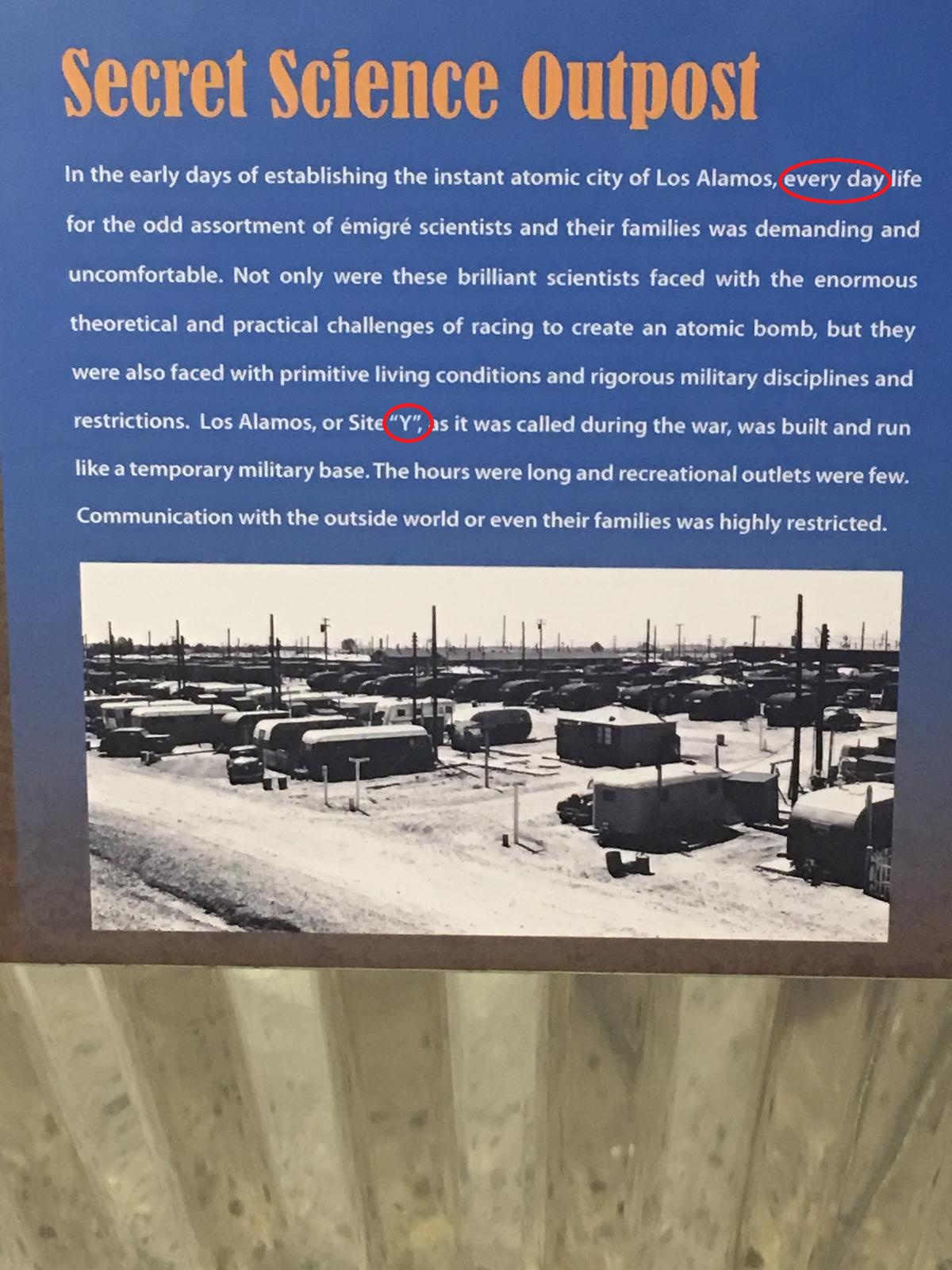
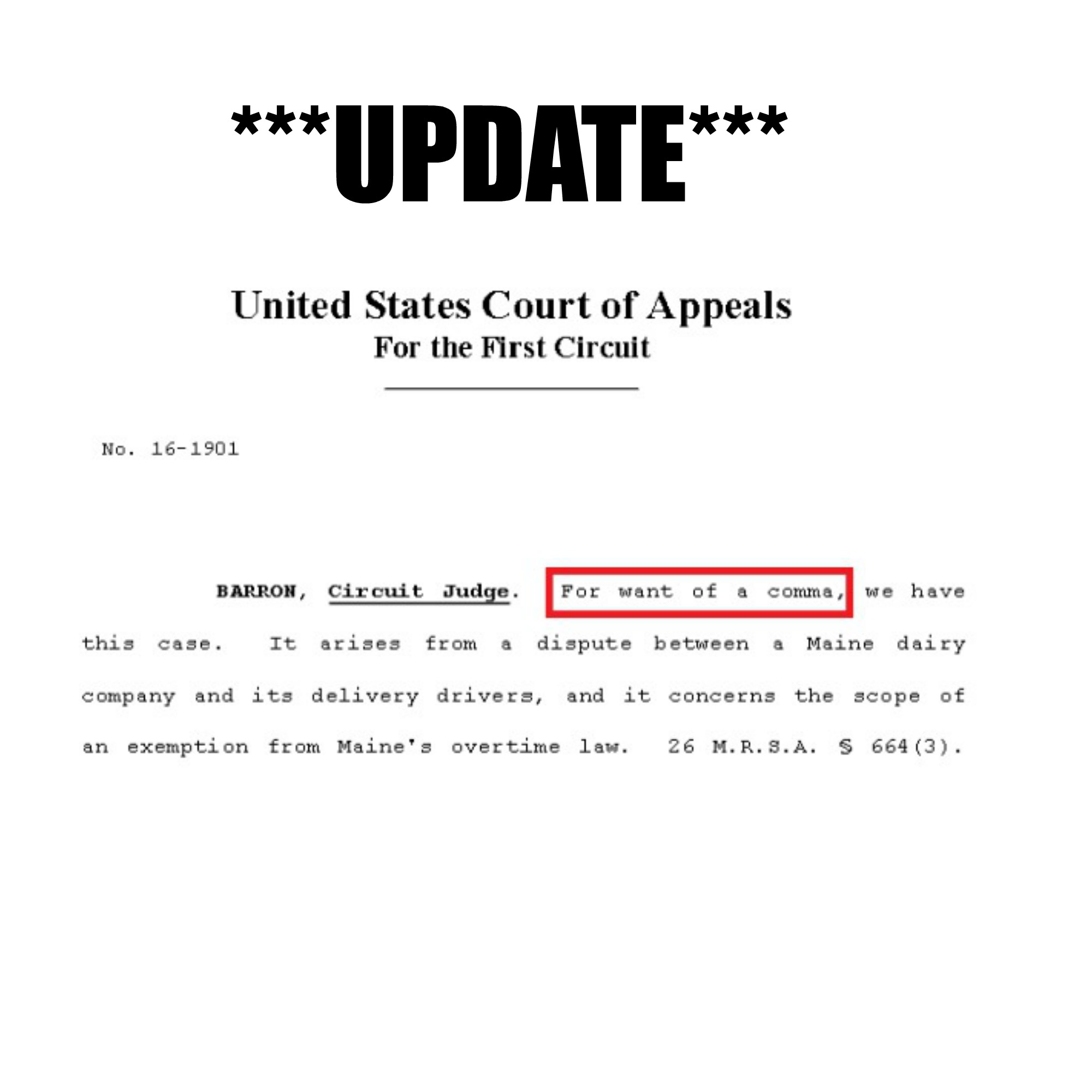 Nearly a year ago, I wrote a blog post about a case, the crux of which was the lack of an oxford comma. Here is the section of that post quoting the language missing the Oxford comma:
Nearly a year ago, I wrote a blog post about a case, the crux of which was the lack of an oxford comma. Here is the section of that post quoting the language missing the Oxford comma:
Here is the law’s wording about activities NOT meriting overtime pay:
The canning, processing, preserving, freezing, drying, marketing, storing, packing for shipment or distribution of:
(1) Agricultural produce;
(2) Meat and fish products; and
(3) Perishable foods.
Based on this language, is packing for shipment its own activity or is it packing for the distribution of the three things on the list? If an Oxford comma had separated “packing for shipment” and “or,” the meaning would have been much more clear. According to court documents, the drivers arguing for overtime actually distribute perishable food, but they do not pack it. That argument helped win the case.
The Oakhurst Dairy drivers who brought the case had asked for $10 million. Court documents filed last week indicate the case was settled for $5 million. All for the want of a comma . . .
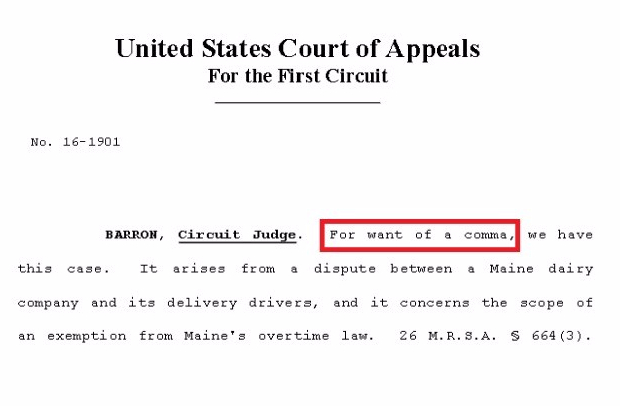 The Oxford comma is subject to debate. It is the comma before the word “and” in a series. For example, “bread, eggs, and milk.” The comma between “eggs”and “and” is called the Oxford or serial comma. It separates all of the parts of a list.
The Oxford comma is subject to debate. It is the comma before the word “and” in a series. For example, “bread, eggs, and milk.” The comma between “eggs”and “and” is called the Oxford or serial comma. It separates all of the parts of a list.
Some style guides tell you to use it and some tell you not to. The Gregg Reference Manual calls for the Oxford comma (¶ 162a).
The thing I always remember that encouraged me to use the Oxford comma was an example of a will that left property to John, Joe and Sarah. If you are literal (as most lawyers are), you could say that the property was left half to John and half to Joe and Sarah to share. If you add the Oxford comma between “Joe” and “and,” there is no question that the property is to be divided into three parts—one for John, one for Joe, and one for Sarah.
In my opinion, it is one small piece of punctuation that can make a huge difference in the meaning and intent of what you are writing. In fact, as most of you may have heard, just last week, an appellate court ruled in a Maine labor dispute based on the Oxford comma. The case was about dairy drivers who argued that they were entitled to overtime pay for certain tasks. The company said they were not entitled to that overtime. The appeals court ruled that the guidelines on activities entitled the drivers to overtime pay because the guidelines were too ambiguous due to the lack of an Oxford comma.
Here is the law’s wording about activities NOT meriting overtime pay:
The canning, processing, preserving, freezing, drying, marketing, storing, packing for shipment or distribution of:
(1) Agricultural produce;
(2) Meat and fish products; and
(3) Perishable foods.
Based on this language, is packing for shipment its own activity or is it packing for the distribution of the three things on the list? If an Oxford comma had separated “packing for shipment” and “or,” the meaning would have been much more clear. According to court documents, the drivers arguing for overtime actually distribute perishable food, but they do not pack it. That argument helped win the case.
The circuit judge said that had the language used the serial comma to mark off the last of the activities in the list, “then the exemption would clearly encompass an activity that the drivers perform.” Since the serial comma was not there to mark off the last of the activities, the judge obeyed the labor laws which, when ambiguous, are designed to benefit laborers and the case was settled.
“For want of a comma, we have this case,” the judge wrote.
But even worse than that is the fact that there are guidelines on how Maine lawmakers are to draw up their documents that do NOT include Oxford commas, so they followed the guidelines they were given. At least they followed the guidelines last week. This week, that guideline may have changed.
I pulled this out of my mailbox this weekend and noticed three errors before I even got back to my house. When the part of an advertisement intended to catch your eye has a glaring error, it really makes the company look bad. While they were consistent with their mistake, there was another anonymous placement of a comma.


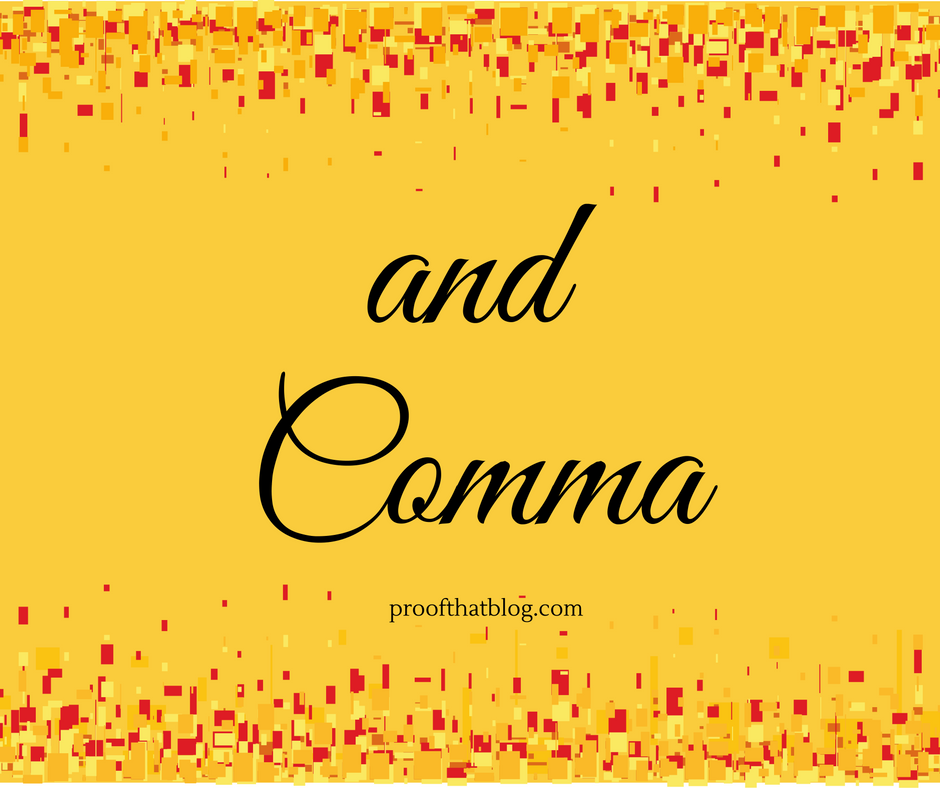 Something that I see a lot in my daily proofreading is a comma before and. Apparently, the lessons in elementary school on serial commas or using commas in compound sentences have morphed into ALWAYS using a comma before the word and. Here are the tricks I use to help figure this out.
Something that I see a lot in my daily proofreading is a comma before and. Apparently, the lessons in elementary school on serial commas or using commas in compound sentences have morphed into ALWAYS using a comma before the word and. Here are the tricks I use to help figure this out.
First, sometimes a compound sentence (which is a sentence of two independent clauses joined by a conjunction) is confused with a simple sentence with a compound predicate (the part of the sentence telling what the subject does or what is done to the subject or the subject’s state of being).
So when you have a sentence that reads:
Jamie was a paralegal and she was highly skilled in trial graphics.
you should read on each side of the and so you will read:
Jamie was a paralegal.
She was highly skilled in trial graphics.
Those are two independent sentences, so a comma is needed before the and when you make it a compound sentence.
Jamie was a paralegal, and she was highly skilled in trial graphics.
Where you have a sentence with a compound predicate, such as:
Jamie was a paralegal and was highly skilled in trial graphics.
there is no comma. You can’t say:
Jamie was a paralegal.
Was highly skilled in trial graphics.
so it is not two independent clauses.
When you are confused about whether they are independent clauses or not, read each part on either side of the and as if it were a separate sentence. If it is a complete sentence, then put the comma before the and. If the two clauses do not make sense as an independent sentence, then there is no comma before the and.
Here are some more examples to help you see this concept.
He needed to go to the grocery store, and he was going to meet James for lunch.
COMPOUND?
He needed to go to the grocery store.
He was going to meet James for lunch.
YES – NEEDS A COMMA.
He needed to go to the grocery store and was going to meet James for lunch.
COMPOUND?
He needed to go to the grocery store.
Was going to meet James for lunch.
NO – NO COMMA NEEDED.
The corporation filed its annual report with the Corporation Commission, and it paid the required fee.
COMPOUND?
The corporation filed its annual report with the Corporation Commission.
It paid the required fee.
YES – NEEDS A COMMA.
The corporation filed its annual report with the Corporation Commission and paid the required fee.
COMPOUND?
The corporation filed its annual report with the Corporation Commission.
Paid the required fee.
NO – NO COMMA NEEDED.
I hope this helps with some of the constant “comma drama” that you may find yourself in daily. Email [email protected] if you have any other “drama” that you would like to see as a topic of a future Proof That proofreading blog post.
Among my many blessings, I count each of you who continue to read this blog, send me pictures, and post things you find on Facebook on my wall. The decision I agonized over a couple of years ago about whether to start the blog was definitely the right one. I truly do appreciate your support! Happy Thanksgiving!
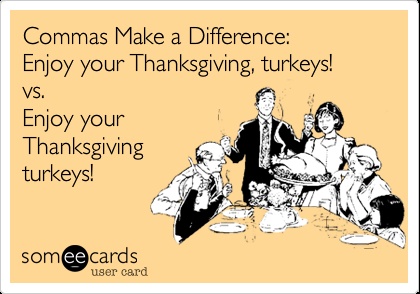
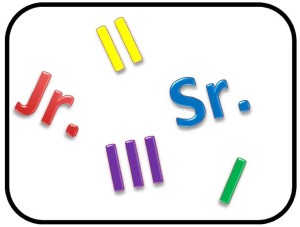 When a father and son have the exact same name (first, middle, and last) the son would use Jr. and the father would use Sr. If a son/grandson continues with the same exact name, the grandson would use III and father and grandfather could continue using Jr. and Sr. or could change to II and I, respectively. The Roman numeral designation II can also be used where a child is named after another relative like an uncle or grandfather. Royalty would always use the Roman numeral designations. The issue comes with whether or not to use a comma. According to the Gregg Reference Manual, the trend is not to use a comma to set off those elements, but the person’s preference should always be respected. If you know that the person prefers the comma in their name, follow these rules:
When a father and son have the exact same name (first, middle, and last) the son would use Jr. and the father would use Sr. If a son/grandson continues with the same exact name, the grandson would use III and father and grandfather could continue using Jr. and Sr. or could change to II and I, respectively. The Roman numeral designation II can also be used where a child is named after another relative like an uncle or grandfather. Royalty would always use the Roman numeral designations. The issue comes with whether or not to use a comma. According to the Gregg Reference Manual, the trend is not to use a comma to set off those elements, but the person’s preference should always be respected. If you know that the person prefers the comma in their name, follow these rules:
John Jones, Jr.
John Jones, Jr., is my son’s best friend.
John Jones, Sr.’s car is being repossessed.
John Jones, Jr. (he is the president of the business club)
Jones, John K., Jr.
When preparing a letter from someone using the Jr., Sr., I, II, or III designation, you do not need to use the designation in the reference initials unless you need it to distinguish this person from another person in the same organization. For instance, a letter I type for Henry R. Miller, Jr. at Miller and Miller Law, P.C., a firm where his father also works, would show the reference initials hrmjr/kas.
Remember that these rules are in instances where the person prefers a comma before their generational designation. In cases where they do not prefer a comma, all of this information is unnecessary, but hopefully at least interesting.

Image credit: icetray / 123RF Stock Photo
Dates seem to be confusing for some people. When you use a complete date (month, day, and year), you should use a comma before AND after the year.
Of course, there are exceptions. For instance, if other punctuation is necessary after the year, you would omit the comma immediately after the year.
Also, if the date is in the day, month, year style (13 November 2013), there are no commas unless the sentence requires a comma for another reason.
Where a comma after the year might lead to some confusion, use a semicolon.
Note that my office will NOT be closed on all of those days. Unfortunately, it is for illustrative purposes only and I will be hard at work on most of those days.
Where you are using just the month and year, there are no commas unless the sentence needs it for another reason.
Don’t be afraid of commas with dates, just learn to use them correctly.